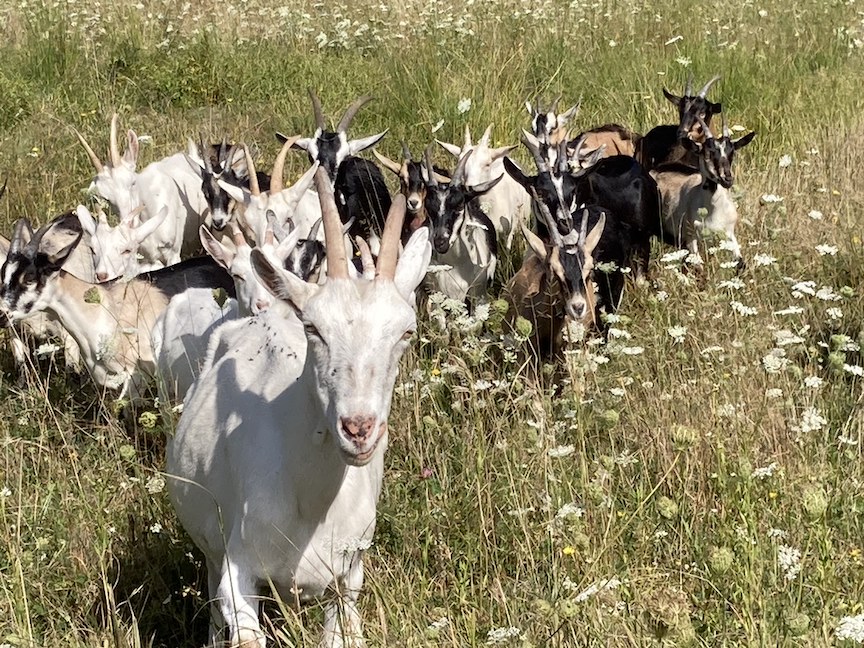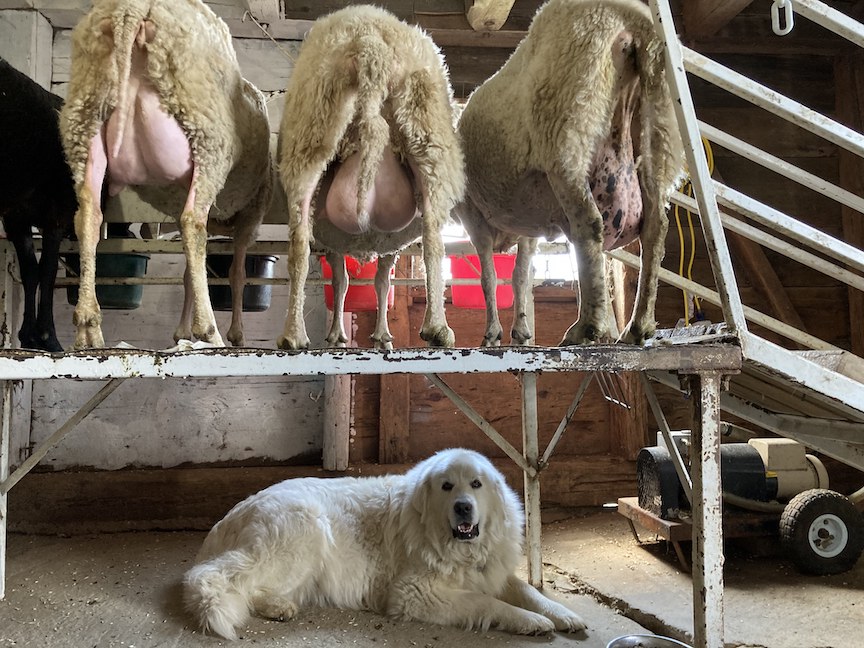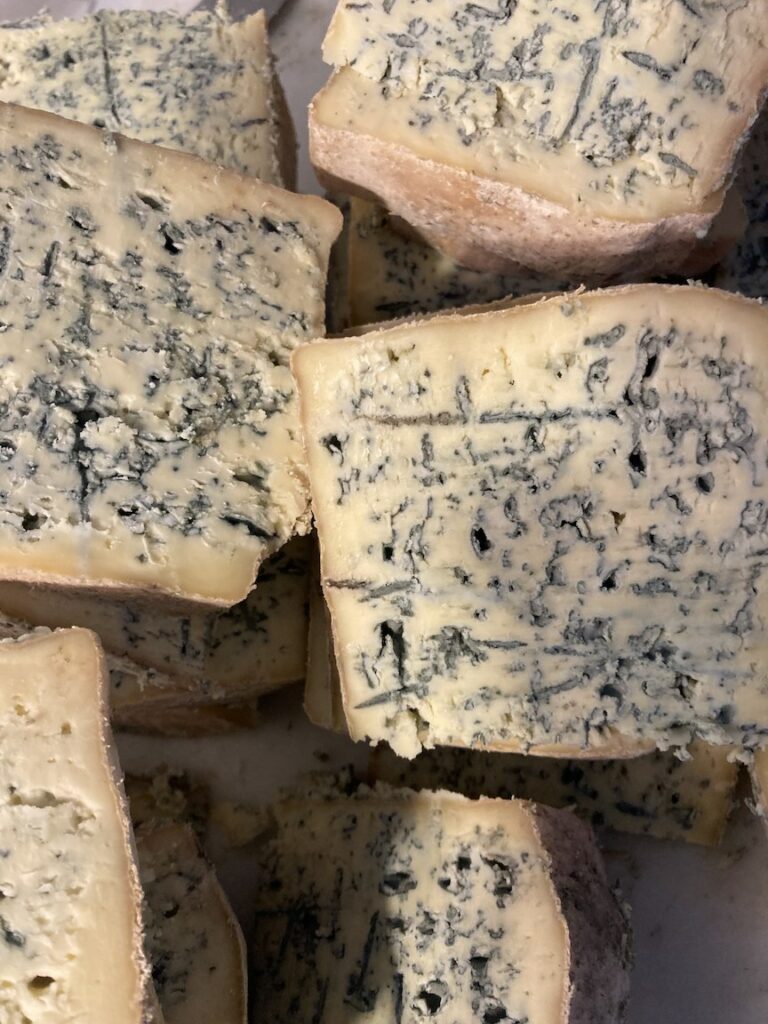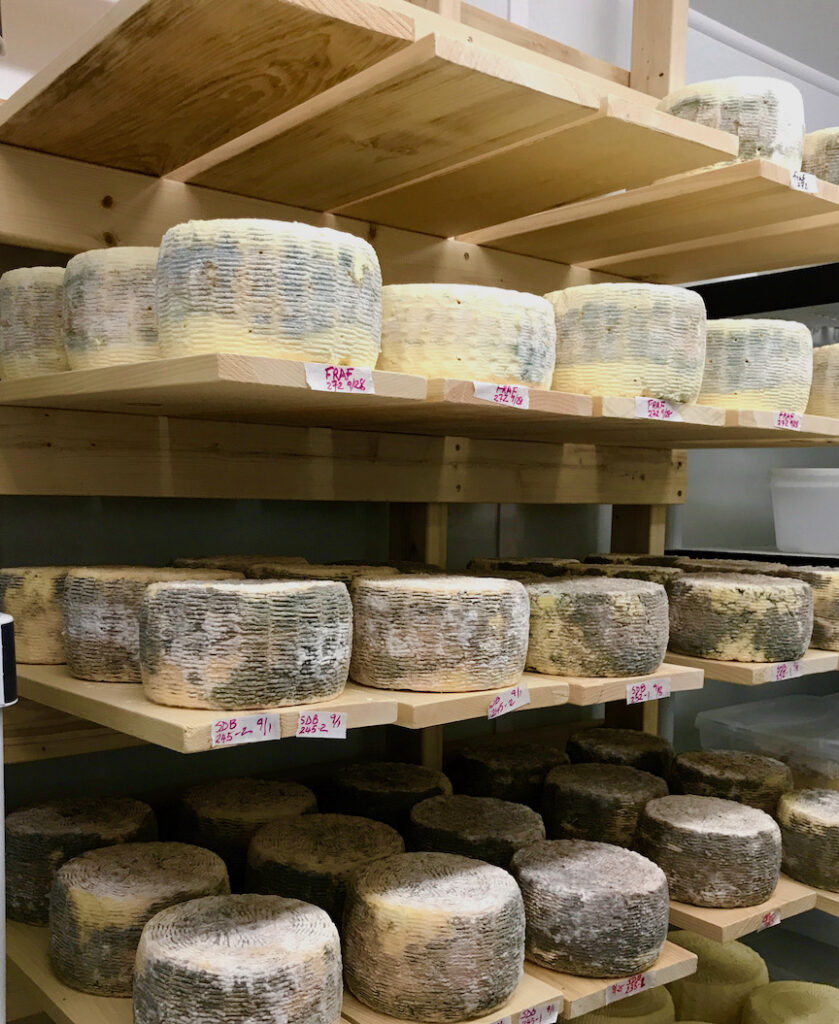by Tim King
Maine Milk Mavens, of Whitefield, Maine, has expanded rapidly since its founding in March 2020. Prior to then Jessie Dowling and her crew were milking goats and sheep at Fuzzy Udder Creamery, also in Whitefield, and selling milk, cheese and related products through farmers’ markets, restaurants, grocery stores and specialty shops throughout Maine. However, the seeds for Maine Milk Mavens, a wholesale distributor of artisanal fermented products, had already been sown in Dowling’s Fuzzy Udder operation.
“Before the pandemic Fuzzy Udder was working with Coppertail Farms and Imaginary Farms — now out of business — and a little bit with Appleton Creamery,” says Dowling. “If we were going to the same places to deliver cheese we would take Coppertail’s cheese to Bar Harbor, for example. It just made sense.”

The idea that small farms and creameries are stronger when they work together seems to be at the core Fuzzy Udder’s business model. Not only was Dowling doing some small-scale cooperative distribution prior to the COVID-19 pandemic, she was also buying milk from other farmers to supplement Fuzzy Udder’s seasonal on-farm milk supply provided by 30 goats and 14 sheep.
“For our cheeses, in addition to our milk, we buy certified organic Jersey cow’s milk from Grace Pond Farm in Thomaston and organically raised sheep’s milk from sheep raised on lush pastures at Misty Brook Farm in Albion,” the Fuzzy Udder website reads.
In early 2020 Dowling could see that the pandemic would make it difficult for many of Maine’s small creameries to distribute their products.
“With the virus it became clear that we needed to get more organized and start moving more of these products around together,” says Dowling.
Dowling was well positioned to organize a group of Maine creameries into an effective wholesale network. Her cheesemaking dates back to 2007 when she began learning the trade, along with farming and marketing skills, under the tutelage of Perry Acworth at Ells Farm & Sheep Dairy near Union and Caitlin Hunter at Appleton Creamery in Appleton.

Early in her career Dowling became involved with the Maine Cheese Guild, becoming first its vice president and then, for four years, its president.
“I’ve been involved with the Cheese Guild for about 14 years so I have really good connections with the Maine cheese community and because I’m a cheesemaker I know the needs of cheesemakers,” she says. “It’s a perfect position for me to be in because I know how to work with this group of people. I don’t think an outsider could come in and do what we’re doing.”
As of last September, Maine Milk Mavens was distributing products for 14 Maine creameries to around 70 retail outlets throughout the state. They had two distribution trucks on the road and rented, in partnership with their neighbor and distribution customer Go-En Fermented Foods, refrigerated warehouse space.
The distribution service was able to scale up quickly because of Dowling’s relationships in the industry and because she didn’t create an entirely new business entity. The company, which has its own legal structure on paper, is owned by Fuzzy Udder. Staff move fluidly between Fuzzy Udder and Maine Milk Mavens as needed. Together, the two businesses provide employment for 10 people, including Dowling.
Although fermented dairy products are the focus of Maine Milk Mavens, the business continues to have a whole-farm sales approach just like Fuzzy Udder has. In addition to selling fermented dairy products, Fuzzy Udder sells meat, tanned hides and fiber. Since Maine Milk Mavens shares a multifaceted marketing approach, their list of products is diverse.
“We sell yogurt, kefir, frozen beef, lamb, goat, pork, charcuterie, sheep and goat skins, soap, lotion, creamery T-shirts, and basically anything that the creamery sells,” Dowling says. “We also distribute Miso from the Go-En Miso fermentory. We let the creamery tell us what they want to sell each week so our availability differs week to week with what’s seasonally available.”
She adds, “We’re really lucky that we have cheeses from all four of the milks that are produced in Maine.” They offer cheese from sheep, goat, cow and water buffalo. Dowling says, “The mozzarella from the Maine Water Buffalo Company is just delicious.”
To let retail customers know what’s in stock, Maine Milk Mavens sends out an email on Monday mornings listing available products from each farm and creamery.
Here’s a taste from a newsletter last summer: “Cheese, cheese and more cheese! Spring Day Creamery has a limited amount of their Boathouse Blue this week. Kennebec Cheesery has their Chevre Pyramids in oil, available in 4 flavors: Red pepper and sundried tomato, Basil, garlic and pine nut, Rosemary, garlic and peppercorn, and Herbes de Provence. Lakin’s Gorges has Morgan, an original recipe cheese available this week as well as their Opus 42.”

Many retailers respond by phone or email on Monday. To help those who haven’t placed an order by Tuesday, Olivia Barber starts phoning customers. Barber, a former pre-school teacher, is a founding Milk Maven.
“Olivia has been with Fuzzy Udder for four years and she helped me create the whole thing,” says Dowling. “She runs all the frontend stuff and I do a lot of backend stuff.”
Barber works the phones pretty much all day Tuesday. “On Tuesday evening we send our orders in to the cheesemakers and on Wednesday they pack their orders,” Dowling says. “On Thursday we have two drivers driving around the state picking up the orders and on Thursday night I have a crew in the warehouse packing orders until it’s done around 10 or 11 p.m. Friday morning we check the orders and make sure they are correct, get the invoices correct, and send them off. Some of them go out through the weekend depending on where they are located in the state.”
Along with operating the Fuzzy Udder farm and cheesemaking business, it’s a lot of work. Dowling says she really appreciates her employees and tries hard to develop a good work environment.
“We try to create a whole culture that is positive and caring for our team,” she says. “It takes a lot of little things like being flexible when people need time off, talking about what’s going on in their lives, and helping each other out. We treat each other like family and we try to eat cheese together at least once a week. When it isn’t crazy busy we do cookouts or go swimming or meet at a brewery. Everyone cares about each other and everyone gets to eat as much cheese as they want.”
The workplace model that Maine Milk Mavens is working to create is the polar opposite of that at Amazon. In fact, Dowling finds Amazon’s treatment of its employees so objectionable she’s boycotting the company.
“I don’t like what happened to Whole Foods when Amazon took over and I don’t think they value their workers,” she says. “I want to prove that a business can survive just fine without them and I really try to support small business as much as I can.”
Supporting small businesses includes paying food producers that choose to distribute through Maine Milk Mavens a fair price for their products.
“In general we ask the creameries what their distributor price is after considering all their costs and then we mark it up to cover our expenses,” Dowling says. “Our goal is for Maine creameries to stay in business so we never ask a creamery to come down on price. We would rather educate our buyer on why our products are expensive because the margins in the dairy industry are so small. Many creameries don’t charge enough for their products because they are afraid of pushback from the marketplace, but we’ve found that when you explain why dairy must be expensive, if we want to keep small-scale dairy alive and thriving in our state, then folks jump on board with us.”

Sarah Spring, of Spring Day Creamery in Durham, likes the way they approach pricing. “The price paid by the Milk Mavens is very fair. Because they are also cheesemakers, they are uniquely situated to know the high costs facing artisans in Maine,” Spring says.
Spring, who has been a Milk Mavens customer since the beginning of the pandemic, previously had her own distribution network.
“Prior to the pandemic, I did all my own deliveries, primarily to the Brunswick and Portland areas,” Spring says. “When the pandemic hit, I went into months of lockdown. The Milk Mavens began sending me orders and picking up cheese once a week.”
Handing the distribution role off to Maine Milk Mavens turned out to be a boon for Spring, whose small-batch cheeses include a number of blue cheeses such as the award-winning Spring Day Blues.
‘My creamery has been thriving,” she says. “I was able to keep going during the pandemic and now my cheese can be found all over Maine. The positive benefits to working with the Milk Mavens have been both economical and quality of life related. Besides, I no longer lose an entire day to deliveries.”
Dowling says Maine Milk Mavens is thriving for the very reasons Spring says their service has helped her. Maine Milk Mavens recognized a need in the small creamery industry, and they responded to it with creativity and hard work.
About the author: Tim King is a produce and sheep farmer, a journalist and cofounder of a bilingual community newspaper. He lives near Long Prairie, Minnesota.
